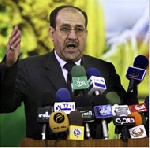 Almotamar.net, Google
Almotamar.net, Google - BAGHDAD � Prime Minister Nuri Kamal al-Maliki announced Friday that he was sending more troops to Mosul to drive the Sunni insurgent group Al Qaeda in Mesopotamia from what he described as its last major stronghold in Iraq.
Mr. Maliki�s remarks came in the wake of successive bombings in the northern capital. On Wednesday a huge blast killed more than 30 people when Iraqi soldiers entered a building packed with explosives by insurgents, and the next day the provincial police chief was killed by a suicide bomber while visiting the site.
After the second attack, the provincial governor, Duraid Kashmola, declared an emergency curfew in Mosul, the third-largest city in Iraq and the capital of Nineveh Province.
Reacting to widespread anger in Mosul, some of it directed at the security forces for triggering the initial bomb, Mr. Maliki said he had set up an operations room in the province to �finish the last battle with Al Qaeda, the gangs and the remnants of the past regime.� Al Qaeda in Mesopotamia is an Iraqi insurgent group that the American and Iraqi governments say is foreign-led.
�We have defeated Al Qaeda and there is only Nineveh and Kirkuk left where the terrorists have fled to,� said Mr. Maliki, speaking in the southern city of Karbala. �This horrible crime caused us deep pain but gave us a motive to accelerate activating operation command. Today the forces started to move to Mosul and the battle will be final.�
It is unclear, however, when and how many new forces will be sent. Maj. Gen. Abdul-Karim Khalaf, an Interior Ministry spokesman in Baghdad, told The Associated Press that 3,000 police officers were being dispatched to reinforce Mosul.
But he gave no date, and in Mosul, one senior Iraqi security official said Friday night that there was no sign of additional forces, though the streets were quiet because of the curfew.
The official, Staff Brigadier Karim Khalaf al-Jbouri is the commander of police operations in Mosul. �Until this moment, no military trucks have entered Mosul and not even a single policeman or soldier from outside the province,� he said in a telephone interview. �We are fighting with our own forces and we didn�t get any kind of support at all, nothing has changed at all except for the curfew.�
Brigadier Jbouri said his men were getting �very good support from the Americans as they cooperate closely with both police and army forces, and we depend on their help a lot.�
Mr. Kashmola, who has more than once in the past threatened to resign as provincial governor in protest over what he has called the government�s failure to take on insurgents in Mosul, promised coordination between the city�s existing security forces and reinforcements sent by Baghdad.
�The military campaign announced by Maliki comes too late, but I excuse him because he was busy with Baghdad and other provinces,� he said on Friday. �Now it is Mosul�s time.�
Ryan C. Crocker, the American ambassador in Baghdad, extended his condolences to the people of Mosul and said American forces and the local provincial reconstruction team were �working closely with Iraqi authorities to ensure they have sufficient medical supplies and humanitarian assistance.� He added that they �stand ready to provide additional support as needed.�
A Ministry of Interior official in Mosul said the original explosion happened near a bridge in Mosul, called Third Bridge, under which insurgents were hanging the bodies of their victims every morning to intimidate area residents.
The official, who spoke anonymously because he was not authorized to speak on the record, said Iraqi and Americans soldiers initially tried to set up two towers nearby for snipers to shoot those responsible for the executions, but that the insurgents destroyed them with rocket-propelled grenades and began executing people again.
�The Iraqi Army then chose this three-story building to put snipers on the roof,� he said. �The gunmen took advantage of the fact that the ground floor includes shops that sell grains, sugar and flour to smuggle in their bombs and improvised explosive devices and plant them inside the building to blow it up.� He said the building, which was originally thought to be a bomb factory, was blown up as Iraqi soldiers went in on Wednesday to defuse the bombs, after being tipped off about their presence by a captured insurgent.
American military figures show that violence fell less dramatically in the north than elsewhere in Iraq during the second half of 2007, when the country saw a 60 percent reduction in attacks. Insurgents are believed to have fled to the north to escape American operations and the Sunni tribal Awakening movement in Anbar, Baghdad and other areas further south.
On Dec. 29, General David H. Petraeus, the American commander in Iraq, confirmed that �the one province in which there has not been a reduction, in which it has just been variable and probably slightly up, is Nineveh Province, Mosul.�
�That,� he said, �is a place that has stayed about the same, roughly.�
The reason, he said, was that the Mosul area �is very important� to Al Qaeda in Mesopotamia because it lay on the routes into Iraq from Syria, Turkey and across from Iran.
Brigadier Jbouri supported that analysis on Friday. �Terrorism has existed in Mosul for a long time,� he said, �but after tracking insurgents down in western areas like Ramadi, they started to move north to our large province, especially because we have border with Syria.�
He characterized the extremists� operations locally as �small simple groups of insurgents in Mosul who get their orders from outside Iraq because they are very disorganized.�
Earlier this month American forces launched a major offensive against Al Qaeda in Mesopotamia focused in Diyala, southeast of Mosul. They described it as the �first battle in a campaign of pursuit against Al Qaeda in Multi-National Division-North, the area which includes Nineveh, Salahaddin, Kirkuk and Diyala provinces.

